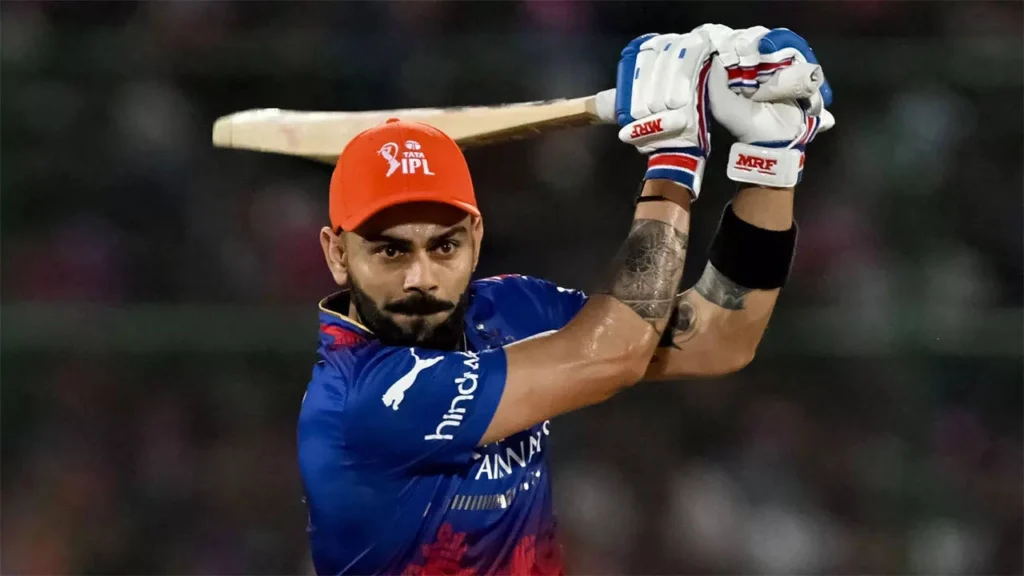RCB Clinches Win, But Kohli’s Strike Rate Under Scrutiny

Virat Kohli’s Strike Rate Faces Huge Criticism – Royal Challengers Bangalore secured a crucial four-wicket win against Gujarat Titans, but the victory was overshadowed by renewed scrutiny of Virat Kohli’s strike rate. While Kohli (42) and Faf du Plessis (62) provided a solid opening partnership, their dismissals triggered a middle-order collapse. Dinesh Karthik and Swapnil Singh eventually steadied the ship and sealed the win, but questions linger about Kohli’s approach.
Points of Discussion:
- Strike Rate vs. Anchoring the Innings: Kohli’s knock came at a strike rate of 100, which some critics see as too slow, especially considering RCB’s batting collapse. They argue a more aggressive approach could have put the game to bed earlier. However, Kohli’s supporters believe his role was to anchor the innings and provide stability, allowing the likes of Karthik to play the big shots later.
- Impact on Team Performance: While Kohli has been RCB’s most consistent batsman this season, some argue his strike rate hinders the team’s ability to post high totals, especially on batting-friendly pitches. This puts pressure on the middle and lower order to score quickly, which can be risky.
- Form vs. Fitness: There have been whispers about a potential dip in Kohli’s batting form. However, his knock against Gujarat Titans showcased his ability to find gaps and rotate the strike. It’s worth considering if his strike rate might be a consequence of managing his fitness for the upcoming T20 World Cup.
- Team Composition and Strategy: RCB’s batting lineup might lack the firepower to complement Kohli’s anchoring style. The absence of a reliable big-hitter at the lower order could be forcing Kohli to bat with more caution. Addressing this imbalance could allow Kohli to play a more aggressive role if needed.
Virat Kohli: The Orange Cap Holder But Target of Strike Rate Criticism
- Despite being the most consistent batter for RCB and the current Orange Cap holder with 542 runs, Kohli has faced criticism for his strike rate (148.08).
- Kohli himself addressed the criticism, stating his focus is on winning games for the team.
Wasim Akram Defends Kohli, Highlights RCB’s Batting Issues
- Former Pakistan captain Wasim Akram believes Virat Kohli is being unfairly criticized for his strike rate.
- Akram points out the lack of support from other RCB batters as a key factor behind the criticism.
- He emphasizes that Kohli’s contributions (high scoring at a decent strike rate) shouldn’t be overshadowed by team losses.
Akram: Focus Should Be on RCB’s Inconsistent Bowling
- Akram urges RCB to analyze their inconsistent performances throughout the season.
- He suggests their bowling attack might be a bigger concern than the batting.
- He criticizes the over-reliance on anchors in T20 cricket, suggesting a more aggressive approach from the start.
The Demise of the Anchor Role in Modern T20s
- Akram views the current IPL season as a sign that the traditional role of anchors in T20 cricket is fading.
- He highlights the high-scoring trends, where teams chase down big totals, and emphasizes the need for an aggressive approach from the beginning of the innings.
Looking Ahead: Can Virat Kohli Silence the Critics for his Strike Rate Criticism?
- With the playoffs approaching, all eyes will be on Kohli to continue his consistent run-scoring form.
- If Kohli can lead RCB to a strong finish in the league stage and potentially a playoff run, it could be a strong response to his critics.
- RCB will also need to address their bowling concerns to achieve success in the remaining matches.
Conclusion
While Virat Kohli has been a consistent run-scorer for RCB in IPL 2024, he has faced criticism for his strike rate. However, Wasim Akram believes the criticism is unfair, pointing to the lack of support from other batsmen and the bigger issue of RCB’s inconsistent bowling attack. Akram also sees the current IPL as a testament to the diminishing role of anchor players in modern T20 cricket, where a more aggressive approach is favored.



